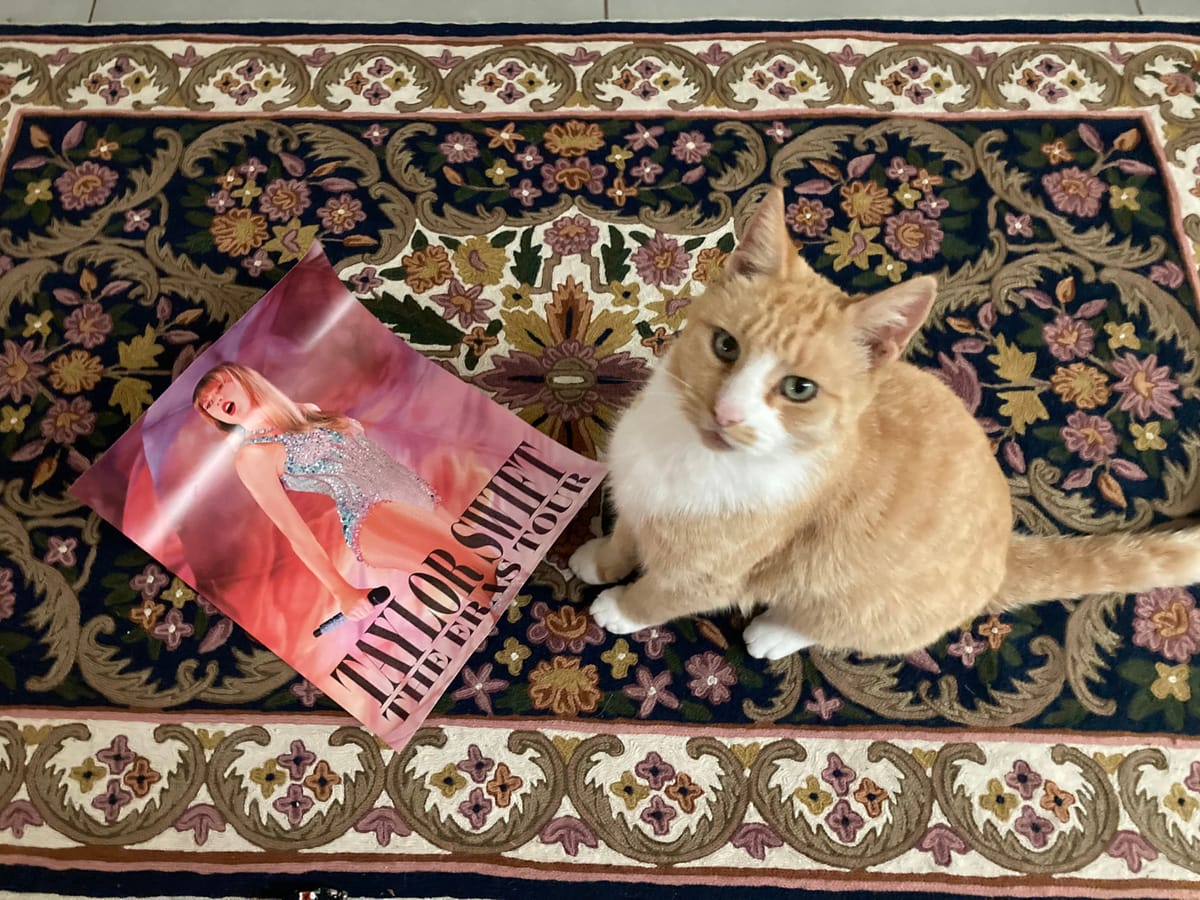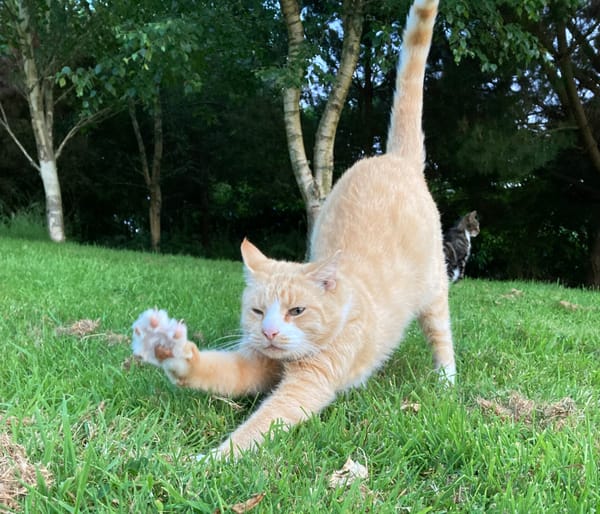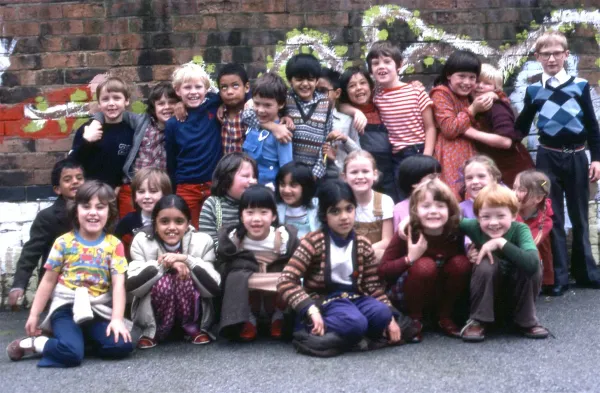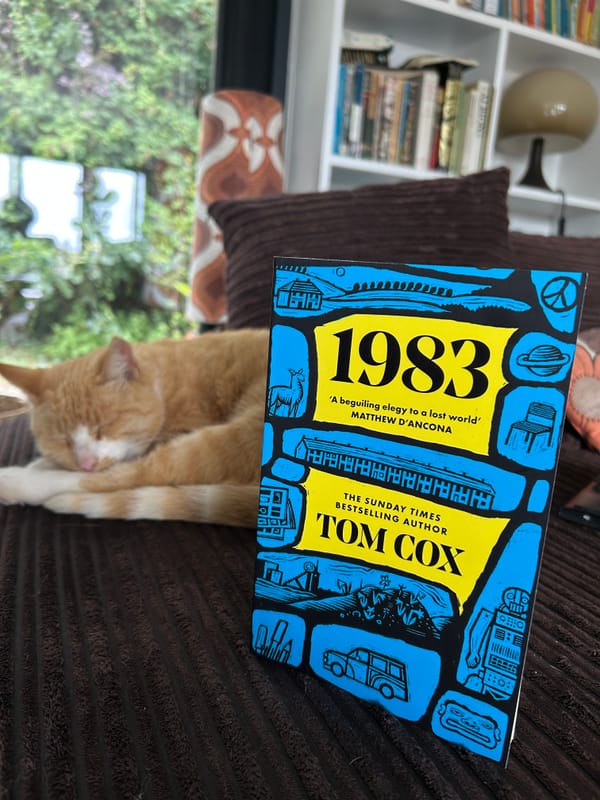He's Writing About Taylor Swift Again, Delete
Why Do We Not Let Each Other Like The Music We Like?

Apparently it’s Taylor’s Swift’s fringe - its many different textures, the clear discrepancies in moisture levels as related to the timeline of the set list - that gives away the fact that her new Eras tour film is not a faithful chronicle of one concert at SoFi Stadium in L.A. but instead a smoothly spliced “best of” the six she played there in early August this year. I have to admit that when I watched it last Friday, despite spending a fair bit of time admiring the fringe in question, I was none the wiser, being not only convinced that I was watching a single night’s singing but that I was right there, amongst the hardest core of Californian Swifties, in one of the 70240 seats that more regularly house fans of the Los Angeles Rams and Los Angeles Chargers football teams, as opposed to in a 1990s-looking Odeon in Devon, UK, next-door to a Tesco Express. I’d been sleepy when I arrived and sceptical regarding how a “just songs” concert film of almost three hours, even one by a singer I love, would keep me awake, let alone entertained, for all that time, but I had somehow failed to anticipate the huge theatrical and spiritual power of the occasion and remember just how much attention-gripping musical ground Swift has covered in her career. In terms of genre-switching and remaining relevant, she has already eclipsed Madonna while simultaneously being the Joni Mitchell you can dance to and the nearest thing you could feasibly ever get to a one person Beatles in an era when musical forms are no longer constantly, rapidly reinventing themselves but technology and language are.
What would an alien have thought, if they’d landed somewhere in the middle of SoFi during one of Swift’s concerts this summer? Seeing the level of worship at hand, and the tall, golden and intermittently sparkly being it was being directed at, they’d surely have assumed they were seeing a religious ceremony and, if they happened to be from a frugal planet, might also have fretted about the electricity bill. Swift was looking especially strong and I couldn’t help be reminded of the moment in Season Four of Buffy The Vampire Slayer when Buffy finds out that Glory, that season’s nemesis, is not a demon, as she’d assumed, but an allegedly invincible she-god. All around us in the cinema, women of diverse ages - there might have been some other men in there, but I didn’t see them, although there were plenty in the crowd in Los Angeles - screamed the words to ‘Shake It Off’, ‘August’, ‘Cruel Summer’, ‘Blank Space’ and ‘Champagne Problems’ back at Swift, not remotely sobered by the six thousand miles separating her from them. The climax was ‘Karma’ - a song I’ve listened to approximately two dozen times in the three days since then - which was entirely fitting and a good example of the amazing knack Swift has of getting you on her side. “Ask me why so many fade but I’m still here,” she sings in it. Such a line would sound colossally arrogant coming from some but, if you know anything about her, and if you’ve been inside the contorting narrative tunnel of her songs, you’re right with her when she sings it. As a fellow fan said to me recently: “One of the likeable things about her is she’s a try-hard but she’s totally unashamed and blatant about being a try-hard.” There is something about her openness about heartbreak and the pressures of fame, the intimacy of her very careful and poetic choice of words, her alternating vulnerability and strength, that has an uncanny ability to make ordinary people think “Yeah, I know exactly what this mindbogglingly rich, conventionally attractive person from an affluent background who has been famous since childhood, and in adulthood has exclusively dated a succession of other famous people, is going through, because I’ve been there too.”
After she read the piece I wrote about Swift’s unexpected ‘Folklore’ album in 2020, my mum - in one of her most “Oh, mum” moments ever - replied, “I bet that singer will be pleased with all the extra sales she got because of your write-up.” In view of the eight homes that Swift owns and her insane level of fame, it’s a comment that continues to make me chuckle, but on the other hand, we live in a fragmentary cultural age when it’s possible for a singer to be that mega famous and for a significant portion of the population not to have heard of her, and certainly not to have heard her music. The piece prompted numerous messages in my inbox from people who had never thought to check out Swift’s songs and, now they had, were very pleasantly surprised with what they’d found. Meanwhile I became aware of a smaller, but also noticeable, segment of other people who felt that, by writing it, I had “let them down”: those who, superficially aware of some of my other listening habits, were horrified that I was enthusing about what they perceived as throwaway records liked by teenage girls. Some, it became apparent, had rationalised it with the fact that I was writing specifically about ‘Folklore’, often perceived as Swift’s “cool”, “mature” or “lo-fi” album and produced by Aaron Dessner, from critical darlings The National. But the truth is The National’s music has never really clicked with me and, much as I love ‘Folklore’, I love many of her dafter, more danceable hits - ‘Shake It Off’, ‘We Are Never Ever Getting Back Together’ - just as much, and, in some cases - ‘Blank Space’, ‘Karma’ - possibly even more. In the end I probably should just admit it, and fess up to the fact that I suffer from a very specific condition, which has caused conflict and misunderstanding between me and some of my fellow humans for many years, and will surely continue to do so. I believe the technical term for the condition, as defined by most medical journals, is Enjoying The Music You Enjoy Without Giving A Fuck About How That Screws With Some People’s Heads And Their Hastily Defined Notions Of Good And Evil.
This is a subject that Swift herself would no doubt have plenty of thoughts about. Eleven years ago, on ‘We Are Never Ever Getting Back Together’, when she was not far into her 20s, she was already singing of the ex who “would hide away and find your peace of mind with some indie record that’s much cooler than mine”. But musical snobbery can take many different forms. I’ve encountered cheesy pop snobs - people desperate to demonstrate how fun and radical they are by browbeating you in an entirely funless way about all the cheap throwaway songs they like and of their blanket intolerance for any music they view as highbrow or experimental - every bit as thunderingly pretentious as indie snobs or jazz snobs. There are some people who go to such lengths to try to show the world that they are not musical snobs that they invent their own different kind of musical snobbery in the process. In the end, the type of music getting weaponised isn’t the problem. The problem is using a type of music to try to assert your superiority over another human being. I am staunchly against this. As a caveat, however, I will add that I can’t help but naturally view people who love Tim Buckley’s ‘Goodbye And Hello’ album, Freda Payne’s ‘Band Of Gold’ or Cher’s version of ‘Walk On Gilded Splinters’ as part of a master race whose proliferation could only improve the health of the planet
We can’t avoid our tribal origins or, often, a linked impulse to attempt to simplify a complex world. A few years ago I expressed an enthusiasm for a brutalist 1960s building on my Instagram account, only to be told by a follower that I “don’t like” brutalist buildings. I definitely do - although certainly not all of them - and anybody who knew me well would know that but from this commenter’s 2D perspective I was the person who liked walking through haunted forests, listening to acid folk music and exploring ruined 17th Century chapels and this new detail clashed violently against the walls as it tried to enter the reassuring box he’d constructed for me. I am similarly aware that there are people who, from some details an algorithm has shown them about me, think I spend every day out dressed in a cape and witchy hat, listening exclusively to psychedelia and funk from 1970, and would be very disappointed to find me out on a walk in an anorak and sensible trousers and singing along to 2Pac’s ‘California Love’ in the car on the way home. We are probably all guilty of a bit of this box-making, especially through the prism of our phones. I remember, many years ago, seeing an artist I liked - someone with a remarkably wild, free Pagan imagination and empathy for the natural world - enthusing online about an-obviously-made-to-soundtrack-adverts faux-earnest yuppie chart-topping album, and feeling a little dismayed, since I’d pictured her record collection as being centred around Don Cherry, Linda Perhacs, Ravi Shankar and Pentangle, with maybe a bit of Afrofunk thrown in. Is that the same as someone being disappointed in me for loving Taylor Swift? I don’t think so, because this singer-songwriter had prompted me to flee shops where his songs had been playing, whereas Taylor Swift is a strong-minded, stubborn genius: the most imaginative, eloquent and consistently exciting pop star of her generation. But I also realise that - as The Dude from the Big Lebowski would put it - that’s just, like, my opinion, man.
There is something particularly tedious about the musical snob who makes a rude and blanketly dismissive comment about a pop musician whose music they have never even half investigated, and possibly never even heard. It’s noticeable how the comment is frequently that much ruder and more blanketly dismissive if the pop musician has a fanbase of teenage girls. But when I was 14, who was the one who was ahead of the curve, and into My Bloody Valentine, Soul II Soul and The Stone Roses? Was it me? No, it was Sara Hardy, who sat next to me in 4th year German class while I, ignorant of all three of them, was busy trying to memorise all the lyrics to ‘Street Tuff’ by Double Trouble And The Rebel MC. Teenage girls were first to The Beatles and Stones and helped push them further into a place where they could make even more radical and interesting music. In the end, as a demographic, they’re a lot like most other musical demographics you try to group by age and gender - including middle-aged men - in the sense that some of them like great music and some of them like unbearably bad music. The band Bread sold loads of records in the early 70s and were dismissed as a “mum band” which is part of what makes people now generally unwise to the fact that their 1969 debut album - despite usually costing no more than about a fiver - is a perfectly constructed sunshine pop masterpiece. At the most rancorous period of Beatles relations after the band’s split, one of John Lennon’s most barbed comments about Paul McCartney was that he made “granny music”, but McCartney saw nothing wrong with writing songs that older women would enjoy and it was undoubtedly his unwillingness to cut himself off from musical styles, or be too prescriptive about the people he was making music for, that made his post-Beatles work more interesting than Lennon’s. Again, that’s just an opinion, and one from someone who is definitely no solo McCartney evangelist, but I will add this: of the post-Beatles albums by Beatles, it was not ‘Ram’ or ‘Band On The Run’ that my nan liked; it was ‘Imagine’.
Just before I turned 24 - the same age that Taylor Swift was writing the best pop song of the 21st Century, ‘Blank Space’ - I was asked by The Guardian, a newspaper I’d been freelancing for for a couple of years, if I’d like to be their Music Critic. By accepting, hesitantly, I found myself in a position where I wielded what, especially with hindsight, seems a preposterous amount of influence: I didn’t play a musical instrument and, despite boundless enthusiasm, my age limited the historical knowledge I could bring to the role, but there I was, telling thousands of people whether to buy records or not every week, often on the basis of a very brief, harassed bit of analysis. I realised how arbritrary and potentially unfair this was, which was part of why I decided to quit, after just a year in the job. I’m even more wary of opinions now than I was then but, despite myself, I still seem to express at least eight or nine of them every month. So here’s another, and one that I’d possibly be expressing right now, if I was still doing that job: the modern day Beatles, who is also known as Taylor Swift, made her first album seventeen years ago, when she was very young, like The Beatles, and very enthusiastic, like The Beatles, and not yet at her best, like The Beatles, and is now making music that’s much more vital and hungry than any Beatles were seventeen years after their first album was released. I sometimes fall into the trap of thinking I want to simplify her into my streamlined, idealised version of her as a musical being: I want her to not collaborate with Ed Sheeran, whose music I dislike, and I feel confused when I find out she likes the solo records of Annie Lennox, whose song ‘Walking On Broken Glass’ makes me feel like that, after being walked on, that same glass has been forcibly pressed into my ear canal. But then I realise that’s bullshit; what I want is for her to be exactly as complex and flawed and unpredictable as she is.
A simple meal can be a very special thing. Even more so if the ingredients are all top quality. You might well also find yourself reliving it afterwards, for days. After we’d seen the Eras film, after it had thrown us down a weekend-long rabbit hole of brilliant, life-affirming music, a lot of which didn’t sound at all like Taylor Swift and some of which did, we both thought with relish of an older, tastefully cured, even wiser Swift, and asked the same thing: What will she do next? What will she do when she’s 40? 50? 60? 70? How fucking good would the record she made be if she voluntarily aged herself in an oak barrel and went properly lo-fi, not just “lo-fi”, as she was on ‘Folklore’? And we realised: these are very rarely questions you find yourself asking, with genuine excitement, about a very famous musician who’s already been around for a long time. Make a hard and fast rule as a music fan and you’ll usually soon realise you’ve built an unnecessary wall in your listening habits but one rule that is hard to deny is that extremely few musicians come up with their best work at their commercial peak, when they are at the point of having everything they ever wanted, materially speaking. The rare ones that do are the ones who don’t box themselves in, who find ways not to be trapped by what they’ve been up until now. They mute the dissenting, controlling voices and stride loosely forward, as true to their own needs as the people getting the most out of their music.
My latest book is called Villager. You can order it, with free worldwide delivery, here from Blackwells. My next book is called 1983. You can reserve a signed hardback here for next year, and contribute to its funding in the process.




